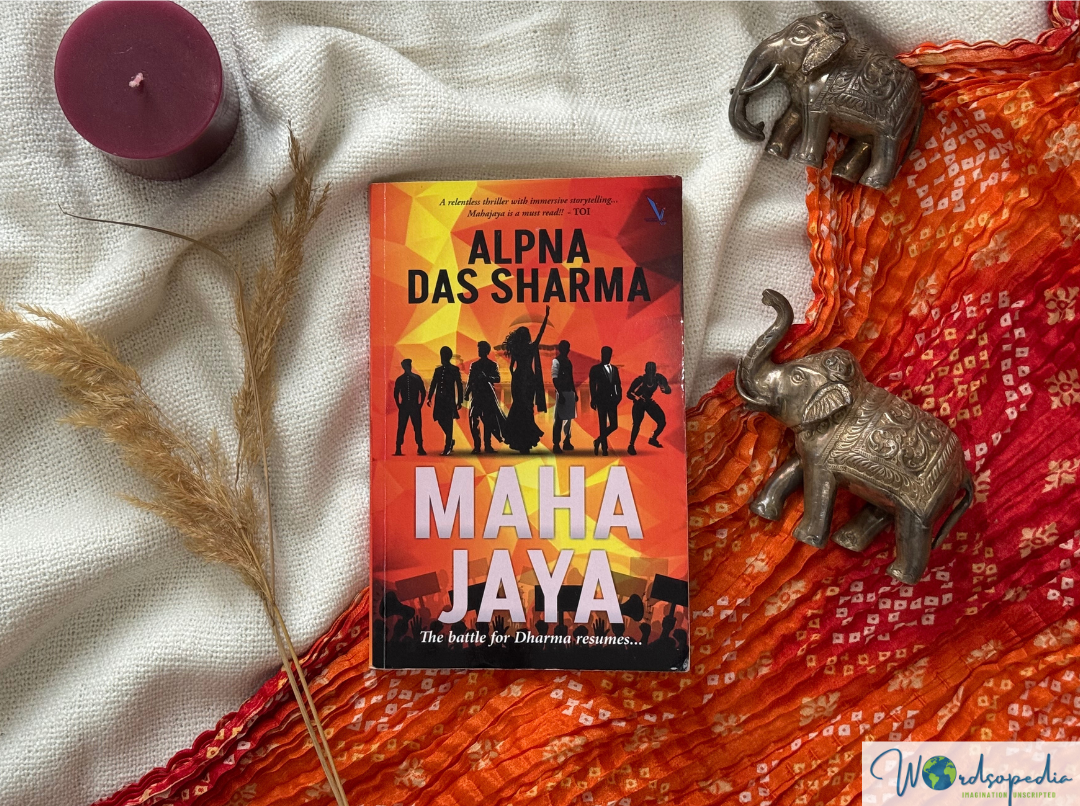Alpna Das Sharma’s debut Mahajaya has been sitting on my bookshelf for a while now, and I’m so glad I finally picked it up. If I were to sum up Mahajaya in a single sentence, I would say, It’s a bold retelling that doesn’t just echo the Mahabharata—it challenges us to re-examine our world.
Having witnessed Alpna’s journey as a writer, I knew her debut would be remarkable. The seamless blend of mythology, modern politics, and personal identity into a story is both intimate and epic at the same time. I can’t wait to get my copy signed during my next visit to India.
At its heart, Mahajaya is a contemporary reimagining of the Mahabharata—set not on a battlefield but on a university campus in Delhi. Interestingly, caste privilege, student politics, gender dynamics, and cultural tension replace chariots and divine weapons. And yet, the battles feel no less real.
I loved how this retelling is rooted in now. Alpna doesn’t force characters into mythological molds. Instead, she breathes new life into them. Mahabharata provides the framework—but the story holds entirely on its own.
Every character is well-crafted, with clear internal conflicts and evolving arcs. Yaj Thakur, a stand-in for Yudhishthir, is principled but deeply conflicted. Dwija, unmistakably inspired by Draupadi, is fierce and complex—a woman whose voice demands to be heard in spaces designed to silence her. Her emotional journey, especially during the scenes where she must assert herself in a hostile environment, is one of the book’s most powerful threads.
Surely, it couldn’t be happening again. She stood at the centre of the court, her fists clenched, as the jeering men circled around her.
That scene, mirroring the Vastraharan moment, is painful and brave—both in how it’s written and what it represents.
Kannan, modeled after Krishna, is one of my favorites. He doesn’t sermonize; instead, he offers gentle nudges, timely silences, and moments of wry wisdom. He’s the steadying presence in a world that is constantly shifting.
In Mahajaya, mythology becomes a moral lens through which we can view modern India. Caste, patriarchy, inherited guilt, and privilege all come under scrutiny. At one point, she writes:
They accepted the lifeless Alexa with the staccato speech in their bedrooms but cleansed the threshold again and again with Ganga jal after the walking-talking human who came to deliver it told them his ‘objectionable’ surname.
The pacing is steady—building from slow emotional introspection to a high-stakes Kabaddi tournament that serves as a modern Kurukshetra. Alpna uses alternating viewpoints to great effect, giving us insights into each character’s moral and emotional terrain. The final few chapters are tense, stirring, and emotionally satisfying. I just couldn’t keep the book down and finished the last few chapters in a single session!
A few lines truly stayed with me long after I finished reading:
Visuals of crowned heads hanging in shame and yards of silk falling in heaps on the floor encompassed me.
I was not the seventh player; I was the secret player, within each one of them.
Each line captures a moment of intense emotion or sharp social critique, beautifully reflecting the novel’s themes of identity, injustice, and resilience. These passages showcase Alpna’s lyrical writing and her fearless engagement with difficult realities.
Mahajaya is not just a novel; it’s a mirror held up to a society still grappling with ancient questions in modern contexts. It is bold in theme, lyrical in prose, and generous in perspective.
If you’re drawn to mythological retellings, nuanced character studies, or stories that make you rethink what justice, duty, and dharma mean today—Mahajaya will speak to you.
Wordsopedia Rating 4.4/5

